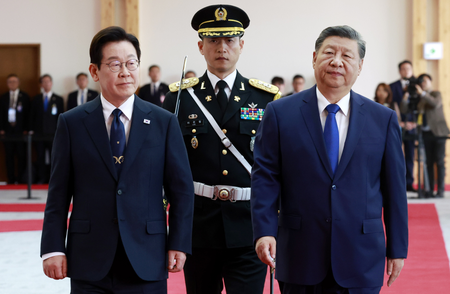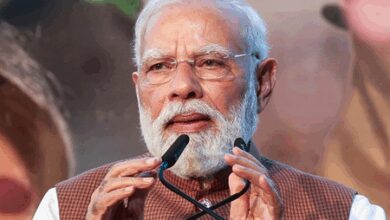Lee, Xi discuss peace efforts, practical cooperation in first summit

Seoul, Nov 1 (IANS) President Lee Jae Myung set a positive tone in relations with Beijing in his first meeting with Chinese President Xi Jinping, as the two leaders agreed on the need to work together to promote peace on the Korean Peninsula and boost practical cooperation.
Their talks took place on the sidelines of the Asia-Pacific Economic Cooperation summit in the southeastern city of Gyeongju, during Xi’s three-day State Visit to South Korea, his first in 11 years.
The summit was closely watched as Seoul strives to maintain a careful balance by improving ties with China, its largest trading partner and a traditional ally of North Korea, while keeping close alignment with the United States amid deepening great power rivalry.
In the talks, which came nearly two months after Xi’s summit with North Korean leader Kim Jong-un in Beijing, Lee sought to leverage the influence of China, North Korea’s main ally.
Lee outlined his government’s initiatives for the denuclearization of the Korean Peninsula and asked for Xi’s constructive efforts to help resume dialogue with North Korea. Xi, in turn, said China would continue its efforts to promote peace and stability on the peninsula, National Security Adviser Wi Sung-lac told reporters, Yonhap news agency reported.
“I and President Xi have agreed to move forward unwaveringly together on the path toward peace,” Lee said during a state dinner after the summit. “As our government works to open a new era of peaceful coexistence and shared growth, I expect that China will also play a constructive role in this process.”
On his part, Xi told Lee that China is willing to deepen communication with South Korea and jointly address challenges, pledging to “contributing greater energy to peace and development in the region.”
Xi said China values its relations with South Korea and will maintain policy consistency and stability, expressing Beijing’s willingness to deepen communication with Seoul.
In addition to security issues, the two leaders discussed ways to expand practical cooperation across sectors.
On the sidelines of the summit, governments of the two nations signed seven memorandums of understanding (MOUs) to broaden cooperation in key areas.
The central banks of the two countries signed an agreement to renew their currency swap deal worth 70 trillion won (US$48.9 billion) for another five years.
The two sides also signed an MOU on strengthening exchanges and services and trade to make progress in negotiations to upgrade their free trade agreement.
Another agreement paved the way for cooperation between the two nations’ law enforcement agencies in responding to voice phishing and online scam crimes.
The discussions also covered sensitive issues, including China’s recent sanctions on U.S. subsidiaries of Korean shipbuilder Hanwha Ocean, which Beijing accused of cooperating with a U.S. investigation into China’s maritime and shipbuilding industries.
Other points of contention, such as China’s installation of steel structures in overlapping areas of the Yellow Sea and Beijing’s restrictions on Korean cultural imports, were also discussed, Wi said, without elaborating on the details.
The National Security Advisor evaluated that the summit marked the “full restoration” of Seoul-Beijing ties achieved through the Lee administration’s “pragmatic” diplomacy centered on national interests.
–IANS
/as





